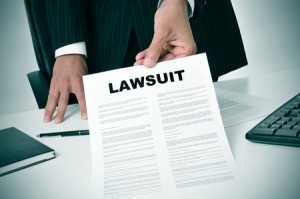
Filing suit in your car accident case is a big step. When you file suit, your case changes from what may have been a negotiation with the other driver’s car insurance company to a more formal procedure governed by court rules, law and in which major decisions may be made by judges and jurors rather than you, your car crash attorney and the adjuster for the car insurance carrier. Your case will usually be controlled by a combination of the law of the state in which your car crash happened and the procedure and evidence rules of the court in which your car wreck lawsuit is filed and possibly, in some cases, terms of your car insurance policy. Some cases may have additional special requirements.
Prerequisites
In many auto accident cases, there are no formal requirements that you must comply with before filing your lawsuit. Often a Kansas City auto accident lawyer, as a matter of practice before filing suit, will send a “demand” to the responsible driver’s car insurance company. This demand can set the stage for settlement negotiations which often result in a settlement, making an auto accident lawsuit unnecessary.
 Formal prerequisites to filing suit exist for some car accident claims. One example is a claim against the United States Government for injuries which occurred in a car accident with a federal vehicle. In this case, the Federal Tort Claims Act has special requirements for filing an administrative claim with the appropriate Federal agency before the injured person may file a lawsuit.
Formal prerequisites to filing suit exist for some car accident claims. One example is a claim against the United States Government for injuries which occurred in a car accident with a federal vehicle. In this case, the Federal Tort Claims Act has special requirements for filing an administrative claim with the appropriate Federal agency before the injured person may file a lawsuit.
Laws governing car crash cases vary widely across the United States. There are specific rules in certain special circumstances, as the example involving the U.S. Government above shows. Therefore, it is difficult to state generally whether or not there are prerequisites to filing a lawsuit in your car crash claim without having information specific to both your case and the law which controls your car wreck case. Therefore, it is best to check with a knowledgeable, experienced car accident attorney to determine what it, if any prerequisites exist, to filing suit in your car wreck case.
Time Limitations
Personal injury cases, including those arising from car accidents are typically subject to one or more time limits. These are often called the “statute of limitations”. From a practical standpoint, what the statute of limitations typically means is that your car accident lawsuit must be filed within the time specified by the applicable statute of limitations or your car wreck suit is subject to being dismissed. Procedural rules may also impose requirements beyond simply filing the lawsuit to fully meet deadline requirements of the statute of limitations. If the statute of limitations and other related requirements are not met your car accident case be dismissed for failure to meet the time requirements without any consideration of the merits of your car wreck claim.
Statutes of limitations often contain a variety of exceptions. Some examples are if the injured person is a minor or is in jail or prison. These exceptions and what, if any additional time they allow to file a car accident lawsuit are very specific to the laws and court decisions of the relevant jurisdiction. Because of the potential complexity of determining and complying with the statute of limitations requirements and the possible loss of your car accident claim for not meeting these, seeking advice about from a skilled and knowledgeable car wreck lawyer about the applicable time limits, as soon as possible after your car crash is highly recommended.
Where to File Suit
 Car accident lawsuits are often filed in the county, circuit or district court for the county in your which the car accident occurred. Depending on local law, in some situations, a car accident case may be filed in a different district, circuit or county court. In some limited circumstances, car accident lawsuits may also be filed in federal court. Requirements for filing a case in federal court typically are that either federal law creates the basis for the claim or that the plaintiff(s) and defendant(s) are citizens of different states and there is more than $ 75,000 at issue. Deciding which court to file your car accident case in can involve an evaluation of which courts the case may be filed in and then determining which one would likely be most advantageous given the available options and the specifics of your car crash case.
Car accident lawsuits are often filed in the county, circuit or district court for the county in your which the car accident occurred. Depending on local law, in some situations, a car accident case may be filed in a different district, circuit or county court. In some limited circumstances, car accident lawsuits may also be filed in federal court. Requirements for filing a case in federal court typically are that either federal law creates the basis for the claim or that the plaintiff(s) and defendant(s) are citizens of different states and there is more than $ 75,000 at issue. Deciding which court to file your car accident case in can involve an evaluation of which courts the case may be filed in and then determining which one would likely be most advantageous given the available options and the specifics of your car crash case.
Case Filing
Formally filing your car accident lawsuit in court typically begins with filing a document, often called a “complaint” or “petition” with the court. Some things typically included in a car accident complaint or petition are a description of why the court has jurisdiction in the case, the location of your car accident and a summary of what happened, why and how the driver of the other car is at fault and responsible, a brief description of your injuries, medical treatment and expenses and a claim for damages.
Depending on court procedure rules and decisions this document may be a very simple basic statement of your claim, or may be much more detailed. Typically, courts charge a set “filing fee” to file your case. The filing fee varies widely from court to court. When you file your car accident case may also be required to complete other papers such as a “cover sheet”.
For hundreds of years lawyers filed court documents in paper format. Some courts still allow the filing of paper documents. In other courts, for example, the federal courts, cases are now typically filed an electronic format. So depending on which court your car accident lawsuit is filed in it may be filed on paper or in electronic format.
Service of Process
When your car wreck lawsuit is filed, the court clerk will typically provide you or your car accident lawyer, one or more copies of the petition or complaint which have been stamped as received by the court. The clerk of the court will typically issue a “summons”. This is an official court document which notifies the defendant that they have been sued and have a certain number of days to respond to the suit typically by filing an “answer” or other document.
For the court to have the power to hear you car crash case and award you damages, the court is usually required to have “jurisdiction” over the case. “Serving” the defendant with the petition or complaint and summons is typically one of the requirements for the court to obtain jurisdiction. One common method of serving the defendant in a car accident case is by having a sheriff or a process server delivered the documents to defendant personally. Court rules and decisions govern how these documents are to be served and can vary widely. In some cases not serving the papers properly can ultimately result in your case being dismissed. Because the requirements for doing this properly can be technical and the consequences of not doing it right can be significant, it is best to have a competent, experienced litigation attorney handle this or advise you about it.
By fully complying with all of the laws, procedural rules and court decisions governing the prerequisites for filing suit, time limitations, jurisdictional requirements, pleading and case filing requirements and service of process requirements your car accident lawsuit should be off to a successful start.




